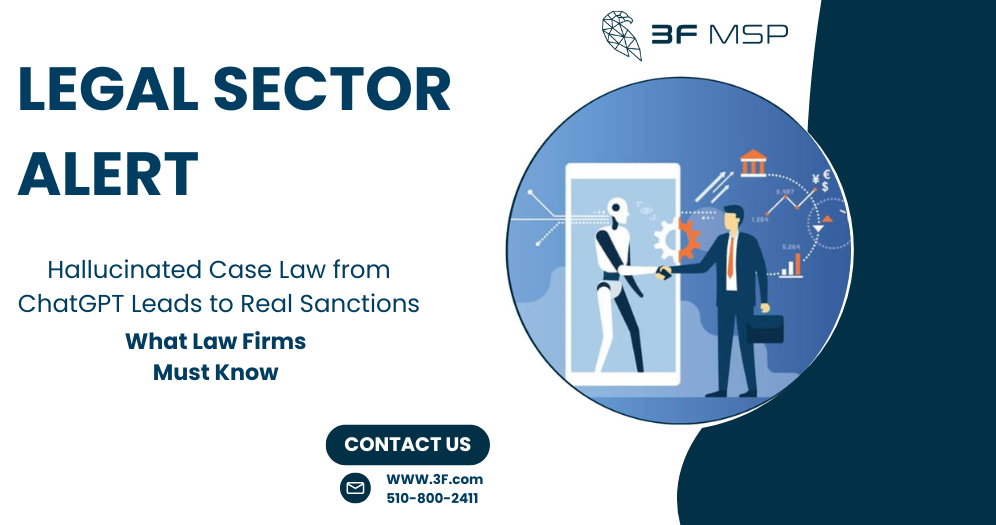

Legal Sector
Legal Sector Alert: Hallucinated Case Law from ChatGPT Leads to Real Sanctions — What Law Firms Must Know
Read more


Legal Sector
Legal Sector Alert: Hallucinated Case Law from ChatGPT Leads to Real Sanctions — What Law Firms Must Know
In the high-stakes world of law, accuracy is non-negotiable. Legal professionals are trusted to bring rigor, diligence, and unimpeachable fact-checking to every filing. But what happens when artificial intelligence gets it wrong — and your team doesn’t notice?
A recent high-profile incident has revealed a critical blind spot in the legal sector: the unverified use of generative AI tools like ChatGPT in court documents. In this case, the consequences weren’t theoretical — they were swift, public, and damaging. This article dives into what happened, why it matters to legal leaders, and how 3F MSP provides the oversight and safeguards you need to protect your practice in an AI-augmented legal environment.
The Incident: Fabricated Legal Citations Submitted to Court
A pair of attorneys representing a client in federal court decided to streamline their legal research by using ChatGPT — a move becoming increasingly common in law firms looking to boost efficiency. But instead of speeding up results, their reliance on AI led them straight into professional disaster. The lawyers asked ChatGPT to provide case law to support their motion. The tool responded — confidently and convincingly — with references to federal court decisions that looked real. But they weren’t. They were hallucinations — a phenomenon where large language models generate plausible but entirely fabricated content. The attorneys, without verifying the sources, cited them in their filings. When the opposing counsel and the judge failed to locate the cases, an investigation revealed that the AI-generated references were fiction. The court issued formal sanctions, citing a breach of the attorneys’ duty of candor and competence.
The Business Impact: More Than Just a Mistake
This wasn’t a minor error. The fallout was serious — and should serve as a wake-up call for every law firm exploring AI tools. Real-World Consequences: - Court-Imposed Sanctions: The attorneys faced professional discipline for misleading the court. - Reputational Harm: Legal media coverage was extensive, and clients began questioning the firm’s oversight. - Malpractice Exposure: The incident introduced legal liability risks for failure to meet professional standards. - Internal Distrust: Colleagues and partners began asking what other tools were being used — and whether more AI mistakes had slipped through.
The Root Problem: Unregulated AI Use in Legal Workflows
Unlike tools purpose-built for legal research (e.g., Westlaw, LexisNexis), ChatGPT and similar LLMs are not designed to verify the legal validity or accuracy of their outputs. They predict what a legal-sounding answer looks like — not whether it’s actually grounded in law. Yet many firms adopt these tools without: - Proper oversight or governance - Staff training on limitations - Vendor vetting or technical safeguards The legal profession is built on precedent, documentation, and truth. Without checks, AI becomes a liability, not an asset.
How 3F MSP Helps Law Firms Use AI Safely
- 1. AI Governance Policy Implementation
- We help your firm create, enforce, and train on AI usage policies that define: - When AI is permitted in legal drafting and research - What validation steps must occur before submission - Who is accountable for verifying outputs - How AI-assisted work is documented and disclosed These governance frameworks align with ABA Model Rules and local bar ethics opinions.
- 2. Secure and Vetted AI Toolsets for Legal Work
- We evaluate, recommend, and manage access to legal-grade AI tools that include: - Source attribution and citation verification - Audit logs of AI prompts and responses - Integration with trusted legal databases Unlike consumer-grade tools, vetted platforms offer safeguards to prevent hallucinations from being treated as facts.
- 3. AI Awareness Training for Legal Professionals
- Through tailored workshops and ongoing coaching, we ensure your attorneys, paralegals, and administrative staff know how to: - Recognize AI limitations - Safely incorporate LLM tools into research and writing - Comply with ethical and professional obligations
What Legal Leaders Should Do Now
If you’re a managing partner, CTO, or compliance officer, consider this your checklist: 1. Audit all use of ChatGPT, Copilot, or similar tools inside your firm. 2. Implement formal policies governing AI use. 3. Train your staff — not just once, but continuously — on safe AI practices. 4. Choose a partner that understands the legal context. You don’t need to ban AI. But you must control it.
Why 3F MSP is the Right Partner for Law Firms
We combine deep cybersecurity and infrastructure experience with a nuanced understanding of legal operations. Our team provides: - Tailored onboarding and risk assessments for AI tools - Long-term compliance monitoring and patching - Cross-team coordination with your legal, IT, and compliance leaders - Support for eDiscovery, privacy, and ethical disclosure standards Whether you’re a boutique firm or a national practice, we help you scale safely in the age of AI.
Ready to Take Control of AI Use in Your Firm?
3F MSP offers legal-specific risk consultations and AI governance workshops for firms ready to protect their people, clients, and reputation. Schedule your free consultation today: - Website: https://www.3f.com/support - Email: [email protected] - Phone: +1 510.800.2411 Don’t let hallucinated case law destroy real-world trust. Build a safer, smarter practice with 3F MSP.
NEVER MISS A POST !
Sign up to get the latest blog posts.


Recent Blogs
Small, medium size enterprises (SME) are increasingly choosing managed service providers as their IT consultants.
Read moreCommon IT Challenges and Solutions: How Your MSP Can Be the Game Changer.
Read more






